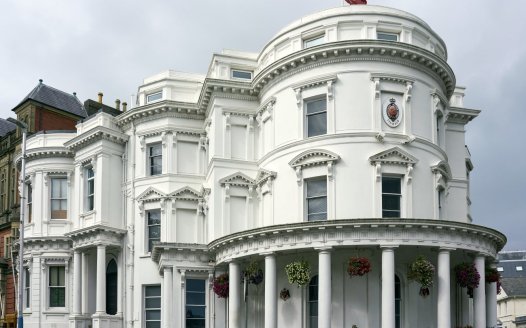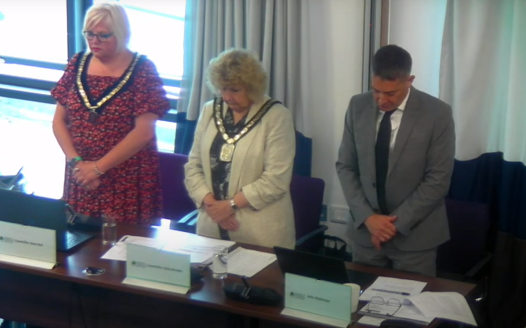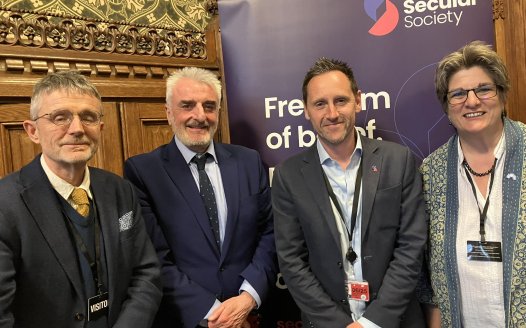Eric Pickles is allowing his evangelical Christianity to cloud his judgment
Posted: Thu, 1st Mar 2012
The National Secular Society has accused the Minister for Communities and Local Government, Eric Pickles, of allowing his evangelical Christian views to cloud his judgment and risk a damaging split in society.
The NSS also says that the Minister is irresponsibly misleading councils in his advice over a High Court decision that prayers could not be included on council agendas.
In response to an NSS member who complained about Mr Pickles unilaterally declaring that he had invalidated a judgment of the High Court on council prayers by bringing forward the Localism Act, a DCLG official said in a letter:
"Our multifaith nation, which has brought many benefits, is not strengthened by the secularisation of civil life. This move is a clear and important signal that this Government values and will champion the continuing role of religion in public life."
Terry Sanderson, president of the National Secular Society, said: "The letter from Mr Pickles' department reads like an editorial from the Daily Mail. It talks of "illiberal and intolerant secularism" and the "marginalisation of faith". It is full of ridiculous claims about threats to the right of Christians to worship.
"Councils have interpreted his comments on the Localism Act as permission to ignore a High Court ruling. Yet the Localism Act is, in fact, far from clear on this issue and completely untested. There is no mention of prayers in the Localism Act and it certainly doesn't give the unqualified right of councils to include prayers on their agenda – there are Human Rights and Equality considerations which Mr Pickles cannot override. It is irresponsible and undemocratic of him to simply declare a High Court decision invalid.
Mr Sanderson pointed out that Eric Pickles has a colourful history in his own constituency in relation to the Peniel Pentecostal Church, which was suspected of entryism into the local Conservative Association.
"We have no objections to anyone's religious beliefs, but Mr Pickles appears to be permitting his own rather extreme religious affiliations to affect policy-making. As a Minister for Communities he is playing an extremely dangerous game by promoting Christianity quite so strongly.
"Polls have repeatedly shown that the majority of people in this country do not want religion to influence public policy-making (67% told yougov that religion has no place in public life while 74% told Ipsos-Mori that religion should have no influence over government policy making). Mr Pickles, however, is allowing his own religious enthusiasm to dominate a department that is supposed to unite communities, not set them against each other.
"Eric Pickles is entirely unsuitable to be Communities Secretary and David Cameron should replace him very soon with someone who has a more balanced approach to community relations. If he doesn't, Mr Pickles risks causing enormous damage to community cohesion by allowing his own rather extreme form of Christianity to dominate his department."
The letter from the Department of Communities and Local Government, dated 11 February from Carol Whale of the DCLG stated:
"The Secretary of State for Communities and Local Government has been clear that this high profile case has generated a public debate about the marginalisation of faith and an illiberal and intolerant secularism. The Secretary of State believes Christianity continues to play an important part in the culture, heritage and fabric of our nation. He is clear that there should be respect for those of other faiths, and those with none. The right to worship is a fundamental and hard-fought British liberty, and the fight for religious freedom in British history is deeply entwined with political freedom.
"The basis of the ruling in the case brought against Bideford Town Council, banning the practice of prayers at the formal beginning of council meetings, was a narrow interpretation of Section 111 of the Local Government Act 1972. In short, it asserted that councils do not have an explicit power to hold prayers as part of the formal business at council meetings.
"As a consequence of the High Court ruling, the Secretary of State decided to fast-track the commencement of the general power of competence in the Localism Act 2011. The power is now in effect for all principal local authorities inEngland(includingLondon, district, county, metropolitan and unitary councils) and by April for parish councils meeting the necessary requirements. Previously councils have only been able to do those things that the law specifically empowered them to do or which are incidental to those things. The new general power of competence turns the current situation on its head. Rather than looking toWhitehallto hand down specific powers, it enables councils to do anything that an individual could do unless it is specifically prohibited by law. These new flexibilities for councils include the freedom to pray and hold prayers at the start of council meetings, should they wish.
"It will of course continue to be for councils to determine the content of prayers, including by reflecting the faith composition of their local area, but the decision on whether to hold prayers is now a local one again. Our multifaith nation, which has brought many benefits, is not strengthened by the secularisation of civil life.
"This move is a clear and important signal that this Government values and will champion the continuing role of religion in public life."







